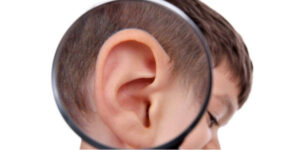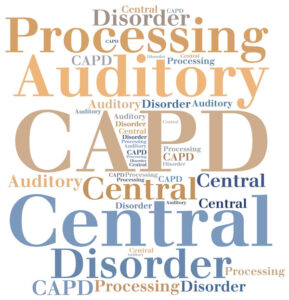What Are the 3 Main Types of APD?
There are 3 main types of APD; Integration, Decoding, and Prosody deficits.

INTEGRATION DEFICIT
The ability of the two ears to process sound in a balanced way, otherwise known as Dichotic Listening.
Dichotic listening skills play an important role in our ability to synthesize, manipulate, and/or attach meaning to multiple auditory targets.
This will impact how quickly and accurately we can process speech in the presence of competing background noise (binaural integration), tune out distractions (binaural separation), and remember and/or act on information processed auditorily (interhemispheric transfer).

DECODING DEFICIT
The ability of the auditory processing system to fill in the missing components of degraded speech (auditory closure) quickly and accurately.
This would include listening situations, such as when someone mumbles, talks rapidly, has a heavy accent, or when there is noise in the background.
This inability to process discretely incoming auditory information creates problems with differentiating between similar sounding words, accurately understanding (or decoding) what is said, with sounding out words, hearing word ending discrimination, and significantly slows the rate at which we can hear and process speech.

PROSODY DEFICIT
The ability of the auditory processing system to extrapolate meaning or intent from the prosodic aspects of speech provided by variations in intonation (rhythm, pitch, stress).
Impaired processing of these subtle timing differences in speech can cause frequent misinterpretation of social cues and inaccurate understanding of the content or true intent of a verbal message.
For example: Look out the window vs. Look out! The window! Same sentence but two completely different messages using intonation to convey meaning.

Knowing which type of APD you or your child has will help identify how the APD weaknesses will likely manifest in their daily life (i.e., the specific behaviors you will see). This is important for guiding management strategies and classroom accommodations to support your child while in the process of treating and remediating the APD.
Which type of APD they have is also critical to the process of how to effectively treat and remediate the APD. A one-size-fits-all APD therapy program has been proven to be ineffective in treating and resolving auditory processing weaknesses. Therefore, effective remediation and resolution of APD requires a deficit specific treatment plan designed to target the specific area in the central auditory processing system which is the source of the problem. To prescribe this targeted Neuro-adaptive APD therapy we must begin with a comprehensive APD assessment designed to identify which type of APD is at the root of the problem. This neuro-diagnostic central auditory processing assessment is done by an Audiologist with specialized training in the diagnosis and treatment of APD.
For more information contact:
Pamela Best, Au.D, CCC-A
Doctor of Audiology & APD Specialist
760-889-8542
